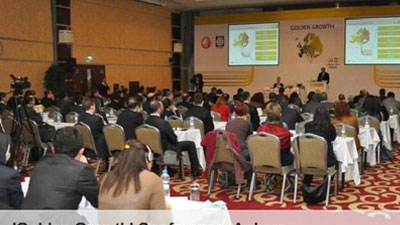After Brussels, Frankfurt and Berlin, Ankara was the next stop for the launch of the newly released ECA flagship report “Golden Growth: Restoring the Luster of the European Economic Model”. On February 1, 2012 lead authors Indermit Gill and Martin Raiser provided a presentation of the findings of the report to a Turkish audience. Co-hosted by the Undersecretariat of Treasury, the event attracted some 100 participants from government agencies, academia, bilateral agencies and the diplomatic corps as well as the media. The launch also provided an opportunity for the new Country Director for Turkey, Martin Raiser, to make his first public appearance before a Turkish audience.
In his opening remarks, Ibrahim Çanakcı, Undersecretary of Turkish Treasury welcomed the work of the World Bank and stressed the timeliness of the report at a time when Europe is in crisis and that the report would be an important reference for policymakers. “Europe is a region that is extremely important for Turkey. We have almost half of our trade and an important portion of our service exports with Europe. Therefore it is of utmost importance for us to see Europe regain stability and start growing again” said Çanakcı.
Martin Raiser, as the new Country Director for Turkey and co-author of the report introduced the background and offered some thoughts on how to link the meaning of the report to Turkey’s own growth prospects and challenges. In particular, the report offers encouraging reading on the potential benefits of integration with Europe, despite recent economic troubles. The report takes a long-term view on growth in Europe, paying special attention to the last two decades, and identifies what needs to be done to assure continued prosperity in the decades ahead. It assesses the six principal components of the European growth model: trade, finance, enterprise, innovation, labor, and government.

